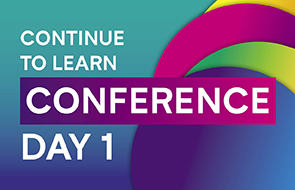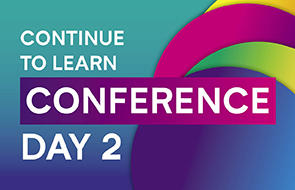- Homepage
- Event listing
- Continue to Learn Conference - Day 3
Continue to Learn Conference - Day 3
Conference - Thursday 21 January (Day 3)
Information for delegates
Ticket holders will be able to access the Conference platform from 9am - 3pm for networking. The sessions will commence at 10am and will end between 2-2.15pm.
Additional content will be added as it is confirmed. Content is subject to change.
Full Access includes both Standard and Full Access sessions
Day 3 Standard Access
Day 3 General session - Marketing Golf: It’s too important to be left to the Marketeers
This session will discuss the importance of all golf stakeholders marketing the brand of golf better if we want golf to grow and having the good sense to do it together: understanding who our customers are and what their (changing) needs are, aggressively promoting why golf is the right choice for improving their lives and delivering an experience that keeps them coming back for more.
Presented by Phil Anderton, Chief Development Officer, The R&A
Drones in greenkeeping
Golf Course 2030: Aggregates: their availability for golf courses and alternative solutions/products
R&A Golf Course 2030 project
Sands and gravels play a crucial role in golf course construction, renovation and maintenance. They are, however, a finite natural resource and there have been reports that some grades used on golf courses will run out within the next 30 years. What will courses currently using these products turn to? Are different grades an option or are there alternatives materials, with a much longer life-expectancy that would be suitable?
Learning outcomes:
• The requirements of golf courses for aggregates
• The results of investigations into the aggregates supply trade to assess what materials are available and how long these materials will last
• Initial investigations into alternative products and/or solutions for dealing with aggregate supply shortages
Presented by Dr Christian Spring, Research Operations Manager, STRI Group
Biostimulants: Fact or Fake News?
The use of biostimulants has increased throughout the turfgrass industry over the past decade. Technically, anything that has a positive impact on living organisms can be classified as a biostimulant, but that list would become too broad very quickly. Confusion still exists about commercial product ingredients, positive effects, and expected outcomes from the application of these materials. This presentation will attempt to define the differences between the terms biostimulant and biofertilizer with examples from each category. Not all products will result in beneficial outcomes for every turfgrass species within every turfgrass environment and under every management regime; therefore, this presentation will outline proper steps to test materials at your specific location.
Presented by Dr. Gerald Henry, Athletic Association Endowed Professor, University of Georgia
Traditional methods of organic matter management – the pro’s and the con’s
There are many methods to managing organic matter and each can be effective when used under the right circumstances. More traditional methods such as hollow core aeration are still widely used and effective, but it is worth comparing to newer techniques to find the right program for your facility.
Presented by Paul Jacobs, North East Region Agronomist, USGA Green Section
The POGO - Moisture Measure, Record, React
An introduction and overview of the POGO system is a mobile device that measures soil moisture, temperature and salinity. Can be used to manage irrigation input, fertilizer applications and record pin placements. Using GPS and integrated Bluetooth, POGO sensors provide automatic analysis and visual reporting to improve water management on all areas of the course.
Presented by Peter Corbett, Chemicals Product Manager - Rigby Taylor Ltd
Golf Course 2030: Sustainable coastal golf course management: challenges and opportunities for nature-based solutions
R&A Golf Course 2030 project
A healthy robust coastal (including dune) system can provide benefits for coast-line protection and multiple additional benefits, including to the players, the management team, wildlife and the local community. This session will outline some of the challenges (e.g. sea-level rise, accelerated coastal erosion, coastal development, recreational pressures) and opportunities (e.g. reduced level of management intervention, increased bio-diversity, greater feeling of well-being) that can be achieved with the introduction of a more ecosystem-based management strategy. This session will provide an overview of the options available for such an approach, as well as providing an update on current GC2030 sustainability projects and opportunities to contribute to national net zero targets through these so-called nature-based solutions.
Presented by:
- Prof William Austin, Professor of Geography & Sustainable Development, University of St Andrews
- Christine Adnitt, Marine and Coastal Ecologist, Royal Haskoning DHV
So you've got earthworms...Now what?
Earthworms are usually considered beneficial organisms, as they aerate the soil, decompose organic matter, and increase plant availability of nutrients; however, earthworm casting on turf surfaces can cause issues with pest invasion, playability, and turf health and maintenance. Managing earthworms is difficult because earthworms remain one of the most poorly understood groups of soil macrofauna, and no products are labeled for control of these beneficial organisms. Come and learn what you can do to manage earthworms and casts on your turf!
Presented by Paige Boyle, Graduate Assistant, Utah State University
The power of understanding others
This session will look at the power of understanding others.
Learning outcomes:
Behind the scenes
Techniques and strategies for assessing personality types
The importance of perception and behaviour
Negotiating with colours
Presented by Phil Helmn MG
Golf Course 2030: Where will you get your water?
R&A Golf Course 2030 project
Water is a critical natural resource for golf course management. The main aim of the research project is to provide easily accessible information to be provided for practitioners in order to make changes to current water management strategies, be that for irrigation or drainage. Current best climate predictions on the effect of climate change on water management on golf courses in the UK and Ireland will be presented in the form of an interactive portal allowing users to view different geographic areas at different times in the future. Climate change predictions will inform summaries of alternative and future water management strategies that will be provided on the portal for easy practitioner access.
Learning outcomes:
• The problem facing golf (legislation, climate change, general water security)
• Solutions available for golf (water harvesting, reduced use, change in user expectations)
• Presentation of three case studies which highlight good practice and examples of what can be achieved with golf courses
• Demonstration of The R&A GC2030 portal, the data and information that is stored on it
Presented by:
- Dr Tom Young, Environment Systems Manager, STRI Group
- Phil Williams, Principle Engineer, EPG
Introducing a World of Nematodes
This short session will give an introduction to the different types of nematodes found in amenity turf grounds. Nematodes, or 'roundworms', are globally abundant microscopic microorganisms. Most have a positive impact on nutrient recycling, but some have evolved specialised feeding habits that classify them as unwanted pests. This session will look at nematodes which feed on plants, bacteria, fungi and insects, explaining why they are important to plant and soil health, providing you with knowledge of nematode biodiversity.
Presented by Dr Deborah Cox, Lagan Valley Scientific
Getting to the root of the problem
This seminar will explore some of the practices that may lead to poor turf quality and disease. We will look at the advances made in research and discuss ways to manage and resolve some of the issues. The seminar will focus on the soil food web and how it can be manipulated to improve turf quality and promote the development of fine grass. The soil beneath our feet is teeming with life, but when we alter the environment this can lead to an imbalance in the ecosystem, creating problems for turf plants. By restoring life to the soil, we can see an improvement in thatch degradation, nutrient uptake, soil friability and drainage; where fine grasses can thrive and playing surfaces are improved. During the session we will explore how to create a healthy root zone for turf that is better able to resist environmental stress and fend for itself against disease.
Learning outcomes:
- An update and insight into soil biology
- An understanding of the practices that impact soil microorganisms
- Suggestions on how to promote a healthy root zone
- Understanding the benefits of a healthy root zone for the improvement of playing surfaces
Presented by Dr Deidre Charleston, Research and Technical Manager, Symbio
A selection of 12 On Demand videos from the Continue to Learn archives
Watch a selection of On Demand videos from the Continue to Learn archives:
- Seven things I've learned about turf around the world (NRC 2020) – Micah Woods, Chief Scientist, Asian Turfgrass Center
- The renovation of Loch Lomond - Part 1 (NRC 2020) – David Cole MG, Director of Golf Course and Estates, Loch Lomond Golf Club
- The new 7th hole at Royal Dornoch (C2L 2020) – Tom Mackenzie, Golf Course Architect, Mackenzie & Ebert and Eoin Riddell, Course Manager, Royal Dornoch Golf Club
- The Ryder Cup - past, present and future (C2L 2017) - Jim McKenzie MBE, Director of Golf Courses & Estates Management, The Celtic Manor Collection; Curtis Tyrrell MG CGCS, Director of Golf Course Operations, Medinah Country Club; Steve Chappell, Head Greenkeeper - PGA Centenary Course, Gleneagles; Chris Tritabaugh, Golf Course Superintendent, Hazeltine National Golf Club; Alejandro Reyes, Course Manager, Le Golf National
- Green speed is more than a number (C2L 2019) – Micah Woods, Chief Scientist, Asian Turfgrass Center
- Maximise your personal impact (C2L 2019) - Mark Doyle, Managing Director, The Method
- Getting Royal Portrush ready for the Open (C2L 2020) - Martin Ebert, Golf Course Architect, Mackenzie & Ebert and Graeme Beatt, Course Manager, Royal Portrush Golf Club
- Non-Chemical Management Strategies for Turf Insects - Leatherjackets and Chafer Grubs (C2L 2019) - Dr Pat Vittum, Professor to Turf Entomology, University of Massachusetts
- 80% People / 20% Turf ‑ The Importance of Creating the Right Culture in the Workplace (C2L 2020) - Craig Haldane, Golf Course Manager, The Gleneagles Hotel
- Turning the turf management dials (C2L 2015) – Chris Tritabaugh, Golf Course Superintendent, Hazeltine National Golf Club
- More than miracles (C2L 2017) – Curtis Tyrrell CGCS MG, former Director of Golf Course Operations, Medinah Country Club
- Flying Blind – Micah Woods latest video release - Micah Woods, Chief Scientist, Asian Turfgrass Center
b and your role in creating future turf managers
• Create a culture of inclusion and learning
Presented by Craig Haldane, Golf Course Manager, The Gleneagles Hotel
Day 3 Full Access
Inspiring and leading millennials
Millennials aren’t necessarily looking for glamorous, overly-fulfilling positions, but they’re certainly viewing a higher bar. Take some surefire methods to attract, develop and retain millennial employees.
Presented by Tyler Bloom, Tyler Bloom Consulting
The Renovation of Loch Lomond – Part 3
Since winter 2017/18 the team at Loch Lomond and golf construction contractors Golflink have almost completed what’s considered to be one of the biggest renovations in British golfing history. Taking place over three consecutive winters, in one of the wettest locations in the UK, 16 holes have been rebuilt, a new irrigation system installed, a full rebuild, extension and new forwards tees added, bunkers rebuilt as well as the renewal of the all-important drainage infrastructure, sand cap and re-grassing plan across the golf course. The last 2 holes are planned to be completed this winter (if no covid lockdowns restrictions)
Following up on the parts 1 and 2, David Cole MG will bring us up to date on the final part of the renovation that he and his team are undertaking at Loch Lomond.
Presented by David Cole MG, Director of Golf Course and Estates, Loch Lomond Golf ClubNew methods for organic matter management
New tools and methods have been developed and researched in the past several years to help manage organic matter while minimizing disruption to the playing surface. This presentation will highlight these new tools and techniques.
Presented by Paul Jacobs, North East Region Agronomist, USGA Green Section
Turfgrass disease control……2020 vision
Throughout the UK and EU there are now severe legislative restrictions on the availability of plant protectants for disease control. Faced with this challenge, turfgrass managers are increasingly seeking additional control tools, focusing on non-chemical and cultural methods to reduce disease incidence.
This session will present the latest research and data in the area of alternative methods for disease control. It will present solid scientific data supporting means of suppression in areas of cultural controls, manipulation of environmental conditions, nutritional IPM (Integrated Pest Management). It will also focus on optimising plant health, and the use of plant defence activators to prime and enhance the plants natural defence mechanisms in order to reduce disease susceptibility.
As part of this session the infection process and the environmental conditions conducive for infection of major turfgrass pathogens will be outlined. And crucially, the defence responses of infected turfgrasses will be explained.
Learning Outcomes
• Understand the infection processes of common turfgrass pathogens, and how infected plants respond to infection with a range of structural and biochemical defences.
• Be able to recognise environmental conditions conducive for infection and be aware of methods to reduce disease pressure
• Understand how an integrated program of cultural practices can be formulated to reduce disease pressure
• Understand that a program of nutritional inputs can have a significant effect on reducing disease incidence with out compromising playing conditions
• Be fully aware that overall plant health is key to ensuring turfgrasses are best able to fight off pathogen challenge
• Following this session attendees will be able to put to together a program incorporating a range of cultural, environmental and nutritional components which will allow for significant reductions in disease levels
Managing performance
This session will help you to manage performance using good practice principles.
Learning outcomes:
Understanding the importance of performance within an organisation
Identifying legal frameworks on performance management
Good practice principles for managing performance
How to respond to underperformers and how to develop over achievers in your team
Presented by Phil Helmn MG
Maintaining high quality playing surfaces in central Europe
In this session Steve will discuss the maintenance practices he uses at Royal Bled Golf Club, Slovenia to produce the high quality playing surfaces expected from an exclusive International Membership. He will discuss fertility, biological and cultural programs used along with the associated challenges faced when maintaining cool season grasses in a hot summer climate.
Presented by Steve Chappell, Golf Course Superintendent, Royal Bled Golf Club
Life With Less Chemical Inputs - Progressive IPM in Practice for 20 Years
Chemical pesticide use in society remains an important concern for the scientific community and the general informed and uninformed public. Effective IPM practices can lead to reductions in pesticide use and overall risk to the environment. Proper use of data for assessing pest pressure, risk of outbreak, precise treatment, and product selection offer opportunities for large scale, sustained reduction of pesticide use. This session will provide a 20 year history of Progressive IPM and how and why we still can be better.
Presented by Dr Frank Rossi, Associate Professor of Horticulture "Grass Guy", Cornell University








